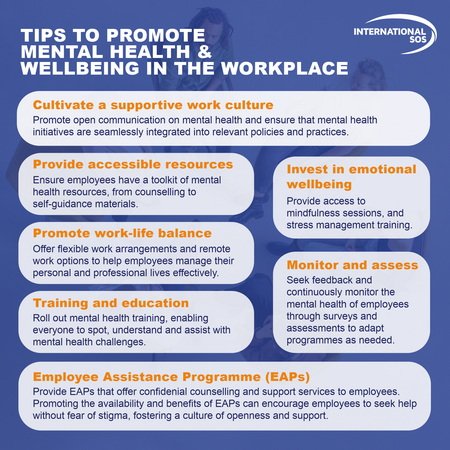โลกยังคงเผชิญกับความท้าทายอย่างที่ไม่เคยปรากฏมาก่อน ทั้งความตึงเครียดทางภูมิรัฐศาสตร์ เหตุการณ์สภาพอากาศสุดขั้ว การระบาดของโรค และความไม่แน่นอนทางเศรษฐกิจ ส่งผลให้สุขภาพจิตของพนักงานกลายเป็นเรื่องเร่งด่วนที่ต้องใส่ใจ ธีมวันสุขภาพจิตโลก (World Mental Health Day) ปีนี้คือ “สุขภาพจิตในที่ทำงาน” (Mental Health at Work) เพื่อเป็นเครื่องเตือนใจสำคัญให้องค์กรต่าง ๆ ลุกขึ้นมาดูแลสุขภาพจิตและสุขภาวะของพนักงาน อินเตอร์เนชั่นแนล เอสโอเอส (International SOS) จึงขอเชิญชวนให้องค์กรทั่วโลกตระหนักถึงความสำคัญของสุขภาพจิตที่ดีและความยืดหยุ่นในการรับมือกับปัญหาของบุคลากร
ความวิตกกังวลที่เพิ่มมากขึ้น
วิกฤตการณ์โลกที่เกิดขึ้นบ่อยครั้งและรุนแรงขึ้น ประกอบกับภาระงานที่เพิ่มมากขึ้น ล้วนเป็นปัจจัยที่ทำให้ระดับความเครียดและความวิตกกังวลพุ่งสูงขึ้น และยิ่งซ้ำเติมปัญหาสุขภาพจิตของแรงงานทั่วโลก องค์การอนามัยโลก (WHO) ประเมินว่าในช่วงเวลาใดเวลาหนึ่ง จะมีผู้ใหญ่วัยทำงานประมาณ 15% ที่กำลังเผชิญกับปัญหาสุขภาพจิต1
นอกจากนี้ ข้อมูลความช่วยเหลือของอินเตอร์เนชั่นแนล เอสโอเอส2 พบว่า ในช่วง 2 ปีที่ผ่านมา ปัญหาสุขภาพจิต 5 อันดับแรกที่พนักงานขอรับความช่วยเหลือมากที่สุด ได้แก่
1.ความวิตกกังวล
2.โรคซึมเศร้า
3.โรคแพนิค
4.โรคสมาธิสั้น (ADHD)
5.ความเครียดเฉียบพลัน
ภาวะหมดไฟก็เป็นอีกปัญหาสำคัญของพนักงาน โดยพนักงาน 1 ใน 4 ทั่วโลกรายงานว่ามีอาการหมดไฟ3 รายงานประเมินแนวโน้มความเสี่ยง ประจำปี 2567 จากอินเตอร์เนชั่นแนล เอสโอเอส (International SOS Risk Outlook 2024) ชี้ว่า ภาวะหมดไฟของพนักงานเป็นภัยคุกคามสำคัญที่ส่งผลกระทบต่อองค์กร4
ผลกระทบทางเศรษฐกิจ
นอกจากนี้ ผลกระทบทางเศรษฐกิจจากปัญหาสุขภาพจิตก็เป็นอีกเรื่องที่มองข้ามไม่ได้ WHO ประเมินว่าทั่วโลกต้องสูญเสียวันทำงานไปประมาณ 1.2 หมื่นล้านวันต่อปีเนื่องจากภาวะซึมเศร้าและความวิตกกังวล ส่งผลให้สูญเสียผลิตภาพคิดเป็นมูลค่า 1 ล้านล้านดอลลาร์สหรัฐต่อปี1 ตัวเลขเหล่านี้ตอกย้ำถึงความสำคัญที่นายจ้างต้องสร้างสภาพแวดล้อมในที่ทำงานที่ส่งเสริมสุขภาพจิตที่ดี และชี้ให้เห็นถึงต้นทุนมหาศาลที่จะต้องจ่าย หากมีการละเลยปัญหาสุขภาพจิตและสุขภาวะของพนักงาน ด้วยเหตุนี้ องค์กรต่าง ๆ จึงมีบทบาทสำคัญในการกำหนดทิศทางของสุขภาพจิตด้วยการกำหนดนโยบายและแนวปฏิบัติที่ส่งเสริมสุขภาวะของพนักงาน
ดร. แคทเธอรีน โอไรลี ผู้อำนวยการด้านการแพทย์ประจำภูมิภาคของอินเตอร์เนชั่นแนล เอสโอเอส กล่าวว่า “วันสุขภาพจิตโลกเป็นเครื่องเตือนใจให้องค์กรต่าง ๆ เล็งเห็นและให้ความสำคัญกับสุขภาพจิตของพนักงาน สภาพแวดล้อมในที่ทำงานมีอิทธิพลอย่างมากต่อสุขภาพจิตของพนักงาน ทั้งในทางบวกและทางลบ โดยที่ทำงานอาจจะส่งเสริมสุขภาวะ หรือมิฉะนั้นก็เป็นปัจจัยที่ก่อให้เกิดความเครียดและความวิตกกังวล เช่นเดียวกับที่เราลงทุนในด้านความปลอดภัยทางกายภาพของพนักงาน เราต้องตระหนักด้วยว่าสุขภาพจิตเป็นส่วนสำคัญของสุขภาพโดยรวม ดังนั้นจึงจำเป็นอย่างยิ่งที่จะต้องให้ความสำคัญกับความยืดหยุ่นของจิตใจในการรับมือกับปัญหา”
“องค์กรต่าง ๆ สามารถเสริมศักยภาพให้พนักงานรับมือกับความท้าทาย การเติบโตและก้าวหน้า และมีส่วนร่วมในการสร้างสภาพแวดล้อมในที่ทำงานให้เป็นบวกและมีประสิทธิภาพมากขึ้น ด้วยการสร้างบรรยากาศที่เกื้อหนุนกัน ส่งเสริมการสื่อสารอย่างเปิดเผย ความเห็นอกเห็นใจ และความเข้าใจ การเข้าถึงผู้เชี่ยวชาญด้านสุขภาพจิต บริการให้คำปรึกษา และโปรแกรมช่วยเหลือพนักงาน ล้วนเป็นสิ่งจำเป็นเพื่อที่จะมั่นใจได้ว่าพนักงานมีความพร้อมที่จะรับมือกับความซับซ้อนของสถานการณ์โลกในปัจจุบัน”

อินเตอร์เนชั่นแนล เอสโอเอส ขอแนะนำองค์กรต่าง ๆ เพื่อสนับสนุนสุขภาพจิตและสุขภาวะของพนักงาน ดังนี้
1.ปลูกฝังวัฒนธรรมการทำงานที่เกื้อหนุนกัน โดยเริ่มจากความมุ่งมั่นของผู้บริหาร: สร้างวัฒนธรรมและสภาพแวดล้อมในที่ทำงานที่ให้ความสำคัญและส่งเสริมการพูดคุยเกี่ยวกับสุขภาพจิตอย่างเปิดเผย ดูแลให้แนวทางการส่งเสริมสุขภาพจิตสอดคล้องกับนโยบายที่เกี่ยวข้องและแนวทางปฏิบัติต่าง ๆ อย่างราบรื่น เพื่อให้การสนับสนุนอย่างเข้มแข็ง
2.จัดเตรียมทรัพยากรที่สามารถเข้าถึงได้: จัดเตรียมชุดเครื่องมือด้านสุขภาพจิตที่พนักงานสามารถเข้าถึงได้ง่ายเพียงแค่ปลายนิ้ว ตั้งแต่การให้คำปรึกษาไปจนถึงชุดคู่มือหรือแนะแนวด้วยตนเอง
3.ส่งเสริมความสมดุลระหว่างชีวิตการทำงานและชีวิตส่วนตัว: เสนอรูปแบบการทำงานที่ยืดหยุ่นและการทำงานทางไกล เพื่อช่วยให้พนักงานบริหารจัดการชีวิตส่วนตัวและชีวิตการทำงานได้อย่างมีประสิทธิภาพ สนับสนุนให้พนักงานได้หยุดพักอย่างสม่ำเสมอ และให้พนักงานเป็นผู้กำหนดลำดับความสำคัญของสุขภาวะของตนเอง
4.การฝึกอบรมและให้ความรู้: ดำเนินโครงการรณรงค์สร้างความตระหนักรู้ด้านสุขภาพจิตอย่างครอบคลุมเพื่อลดการตีตรา จัดการฝึกอบรมด้านสุขภาพจิตเพื่อให้ทุกคนรับรู้ เข้าใจ และช่วยเหลือในประเด็นที่เกี่ยวกับความท้าทายด้านสุขภาพจิต
5.ติดตามและประเมินผล: ติดตามสอบถามความคิดเห็นและคอยเฝ้าระวังสุขภาพจิตของพนักงานอย่างต่อเนื่องผ่านการทำแบบสำรวจและแบบประเมิน เพื่อปรับโปรแกรมตามความจำเป็น
6.ลงทุนในด้านสุขภาวะทางอารมณ์: จัดให้มีกิจกรรมในการฝึกสติการรับรู้และการจัดการความเครียด ร่วมมือกับผู้เชี่ยวชาญด้านสุขภาพจิตที่ได้รับการรับรองเพื่อให้บริการให้คำปรึกษาและสนับสนุนอย่างเป็นความลับ
7.โปรแกรมช่วยเหลือพนักงาน (Employee Assistance Programs หรือ EAPs): จัดให้มี EAPs ที่ให้คำปรึกษาที่เป็นความลับและบริการสนับสนุนแก่พนักงาน ประชาสัมพันธ์ให้พนักงานทราบถึงบริการและประโยชน์ของ EAPs เพื่อส่งเสริมให้พนักงานกล้าขอความช่วยเหลือโดยไม่ต้องกลัวการถูกตีตรา เสริมสร้างวัฒนธรรมที่เปิดกว้างและให้การสนับสนุนซึ่งกันและกัน
World Mental Health Day 10 October 2024 From Stress to Strength The Impact of Mental Health Support in the Workplace
As the world continues to face unprecedented challenges, including geopolitical tensions, extreme weather events, disease outbreaks, and economic uncertainty, the mental health of employees has become a pressing concern. This year’s World Mental Health Day theme, “Mental Health at Work”, is a crucial reminder for organisations to take action to safeguard their workforce’s mental health and wellbeing. In alignment with this theme, International SOS, the world’s leading health and security risk services company, encourages organisations worldwide to recognise the critical importance of mental wellbeing and resilience within their workforce.
Heightened anxiety
The increasing frequency and intensity of global crises, coupled with elevated job demands, are contributing to heightened levels of stress and anxiety, further exacerbating mental health concerns among the global workforce. According to the World Health Organization (WHO), an estimated 15% of working-age adults are experiencing a mental disorder at any single point in time.1
Additionally, International SOS assistance data2 reveals that over the past two years, the top five mental health-related assistance requests the organisation received are:
1.Anxiety
2.Depression
3.Panic disorder
4.Attention Deficit Hyperactivity Disorder (ADHD)
5.Acute stress
Burnout has also become a prominent issue among employees, with one in four employees worldwide reporting symptoms of burnout.3 The International SOS Risk Outlook 2024 report highlights employee burnout as a major threat impacting organisations.4
Economic impact
Moreover, the economic impact of mental health issues cannot be ignored. The WHO estimates that globally, approximately 12 billion working days are lost annually to depression and anxiety, resulting in US$ 1 trillion in lost productivity per year.1 These figures highlight the importance for employers to create a workplace that promotes mental wellbeing and underscores the immense cost of neglecting employee mental health and wellbeing at work. Organisations play a pivotal role in shaping the mental health landscape by implementing policies and practices that promote wellbeing.
Dr Katherine O’Reilly, International SOS Regional Medical Director, said, “World Mental Health Day is a timely reminder for organisations to acknowledge and address the profound importance of mental wellbeing within their workforce. The workplace environment can have a significant impact on employee mental health, both positive and negative, by either fostering wellbeing or contributing to stress and anxiety. Just as we invest in employee physical safety, it is important to also understand that mental health is integral to overall health. It is therefore imperative to prioritise mental resilience.
“Organisations can empower their employees to navigate challenges, thrive and contribute to a more positive and productive workplace by creating a supportive work environment that fosters open communication, empathy and understanding. Providing access to mental health professionals, counselling services, and employee assistance programmes is essential to ensure employees are equipped to navigate the complexities of today’s global landscape.”
To support the mental health and wellbeing of their workforce, International SOS provides advice for organisations:
1.Cultivate a supportive work culture with strong leadership commitment: Create a workplace culture and environment that prioritises and promotes open communication on mental health. Ensure mental wellbeing initiatives are seamlessly integrated into relevant policies and practices to provide robust support.
2.Provide accessible resources: Ensure employees have a toolkit of mental health resources at their fingertips, from counselling to self-guidance materials.
3.Promote work-life balance: Offer flexible work arrangements and remote work options to help employees manage their personal and professional lives effectively. Encourage regular breaks and empower employees to prioritise their wellbeing.
4.Training and education: Implement comprehensive mental health awareness campaigns to reduce stigma. Roll out mental health training, enabling everyone to spot, understand and assist with mental health challenges.
5.Monitor and assess: Seek feedback and continuously monitor the mental health of employees through surveys and assessments, and adapt programmes as needed.
6.Invest in emotional wellbeing: provide access to mindfulness sessions and stress management training—partner with certified mental health professionals to offer confidential counselling and support services.
7.Employee Assistance Programmes (EAPs): Provide EAPs that offer confidential counselling and support services to employees. Promoting the availability and benefits of EAPs can encourage employees to seek help without fear of stigma, fostering a culture of openness and support.
1.World Health Organization | WHO guidelines on Mental health at work
2.International SOS Assistance Data (2022 – 2024)
3.McKinsey Health Institute | Employee Mental Health and Wellbeing Survey 2022
4.International SOS Risk Outlook 2024 Report
5.World Health Organization | Mental health at work fact sheet




